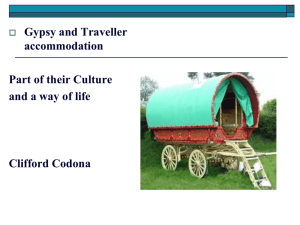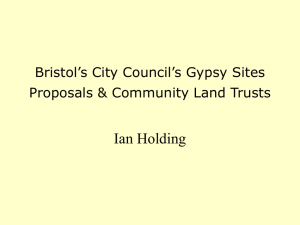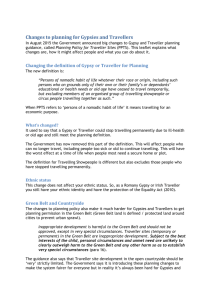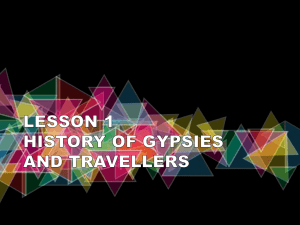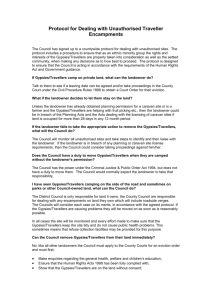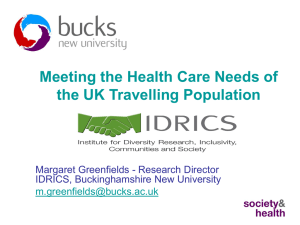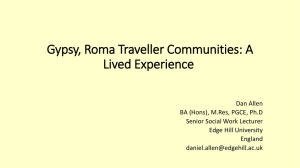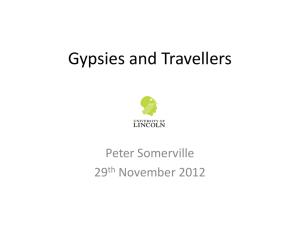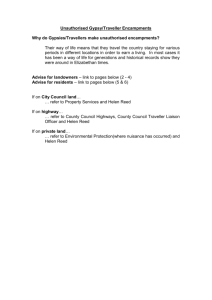Housing and Planning Bill House of Commons Committee Stage
advertisement
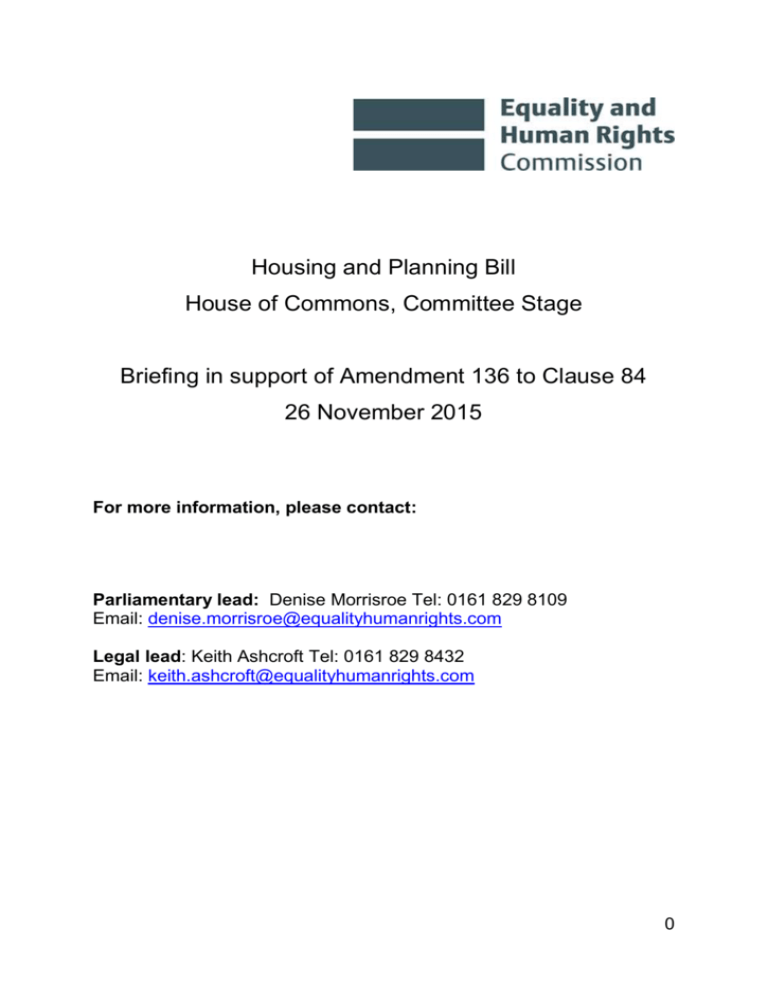
Housing and Planning Bill House of Commons, Committee Stage Briefing in support of Amendment 136 to Clause 84 26 November 2015 For more information, please contact: Parliamentary lead: Denise Morrisroe Tel: 0161 829 8109 Email: denise.morrisroe@equalityhumanrights.com Legal lead: Keith Ashcroft Tel: 0161 829 8432 Email: keith.ashcroft@equalityhumanrights.com 0 Introduction This briefing supports Amendment 136 to Clause 84 of the Housing and Planning Bill. This Amendment seeks to preserve sections 225 and 226 of the Housing Act 2004, which impose a duty on local housing authorities to assess the specific accommodation needs of Gypsies and Travellers (and Travelling Show people) residing or resorting to their area, and provide for guidance on how this is undertaken. In the Commission’s analysis, repealing this duty may be in breach of the Government’s obligations under domestic and international law. Clause 84 Amendment number 136 Explanation As the Members’ explanatory statement sets out, ‘this amendment would retain sections 225 and 226 of the Housing Act 2004 regarding accommodation needs of gypsies and travellers’. These provisions require local housing authorities, when carrying out a review of housing need under section 8 of the Housing Act 1985, to assess the accommodation needs of Gypsies and Travellers who reside in or who resort to their area, and enable the Secretary of State or National Assembly for Wales to issue guidance on how this should be done. Commission’s recommendation Support amendment 136. Our analysis Clause 84 of the Housing and Planning Bill would remove the duty on local housing authorities to assess the specific accommodation needs of Gypsies and Travellers (and Travelling Show people) residing or resorting to their area and the provision of guidance on how this is undertaken. The Impact Assessment published with the Bill explains that the Government’s preference is to move away from separate provisions for Gypsies and Travellers in favour of a unified approach, assessing the housing needs of the entire community and removing the perception of favourable treatment. Gypsy and Traveller Accommodation Need Assessments were introduced because the specific accommodation needs of these 1 communities had not previously been properly assessed. The Communities and Local Government Gypsy and Traveller Accommodation Needs Assessments Guidance of 2007 stated: ‘In the past, the accommodation needs of Gypsies and Travellers (especially those who live in caravans or mobile homes) have not routinely formed part of the process by which local authorities assess people’s housing needs. The consequences of this have been that the current and projected accommodation needs of Gypsies and Travellers have often not been well understood.’ When the new planning system was introduced by the Housing Act 2004, the aim was to provide for an evidence-based, strategic and regional system, in which the needs and wider demand of the Gypsy and Traveller communities for suitable accommodation could be considered and met equally and fairly alongside other sectors of the community. Homelessness among Gypsies and Travellers living in caravans is currently estimated at about 20%. Gypsies and Travellers are among the most disadvantaged communities in England, Wales and Scotland, and the provision of appropriate accommodation is absolutely central to addressing the wider inequalities that they experience including access to healthcare, schools and other vital public services. The Commission’s recent report, “Is Britain Fairer?”, highlighted that Gypsy and Traveller pupils continue to have the lowest educational attainment rates of any ethnicity, and life expectancy is lower for members of the Gypsy and Traveller communities. In addition, the selfreported health status for some people with specific characteristics (including Gypsies and Travellers) is worse. The UN Special Rapporteur on adequate housing made a number of observations relating to the specific problems facing Gypsies and Travellers. She noted the stigma and discrimination they face and how this underpins their lack of residential and transit accommodation and a range of other problems, including access to education, work, health care and inclusion in community life. She also raised issues, documented in the Commission’s 2011 submission to the United Nations Committee on the Elimination of all Forms of Racial Discrimination, about the quality and location of sites, which noted that many Gypsies and Travellers were recognised to be caught between insufficient accommodation and sites suitable for their needs and the insecurity of unauthorised sites which could lead to evictions, violent and threatening behaviour. A Scottish Parliament report (2013) which explored ‘Where 2 Gypsy/Travellers live’, also detailed ‘shocking standards of living’ and instances of discrimination. Our submission noted the need for Government to support local authorities to demonstrate compatibility with the Human Rights Act 1998 and the Public Sector Equality Duty in developing housing, homelessness, planning and sustainable communities strategies. In the Commission’s analysis, if the duty to assess accommodation need is removed this is likely to result in fewer sites, less land allocated in local plans to meet that need, and increased homelessness. We consider that Clause 84 may be in breach of the following obligations under domestic and international law to protect the Gypsy way of life and to take positive measures where necessary to do so: Domestic Law: Article 8 of the European Convention on Human Rights (ECHR): The obligation under Article 8 was summarised by the European Court of Human Rights in Chapman v UK (2001) 33 EHRR 18 as follows: 1 The vulnerable position of Gypsies as a minority means that some special consideration should be given to their needs and their different lifestyle both in the relevant regulatory planning framework and in arriving at decisions in particular cases. To this extent there is thus a positive obligation imposed on the Contracting States by virtue of Article 8 to facilitate the Gypsy way of life [96]. International Law: Article 4(2) of the European Framework Convention for the Protection of Minorities (“Framework Convention”) : The Parties undertake to adopt, where necessary, adequate measures in order to promote, in all areas of economic, social, political and cultural life, full and effective equality between persons belonging to a national minority and those belonging to the majority. In this respect, they shall take due account of the specific conditions of the persons belonging to national minorities. Article 5 of the Framework Convention 1 Chapman v United Kingdom [2001] 33 E.H.R.R. 18 3 The Parties undertake to promote the conditions necessary for persons belonging to national minorities to maintain and develop their culture, and to preserve the essential elements of their identity, namely their religion, language, traditions and cultural heritage. Article 27 of the International Covenant on Civil and Political Rights (“ICCPR”): In those States in which ethnic, religious or linguistic minorities exist, persons belonging to such minorities shall not be denied the right, in community with the other members of their group, to enjoy their own culture, to profess and practise their own religion, or to use their own language. The Human Rights Committee amplified this obligation in general comment 23; …positive measures by States may also be necessary to protect the identity of a minority and the rights of its members to enjoy and develop their culture and language and to practise their religion, in community with the other members of the group. In this connection it has to be observed that such positive measures must respect the provisions of articles 2.1 and 26 of the Covenant both as regards the treatment between different minorities and the treatment between the persons belonging to them and the remaining part of the population. However, as long as those measures are aimed at correcting conditions which prevent or impair the enjoyment of the rights guaranteed under article 27, they may constitute legitimate differentiation under the Covenant, provided they are based on reasonable and objective criteria [6.2]. Public Sector Equality Duty Section 149 of the Equality Act 2010, the Public Sector Equality Duty (PSED), requires those carrying out public functions, including Government departments and Ministers of the Crown, to have due regard to the need to eliminate unlawful discrimination, advance equality of opportunity and foster good relations. This is an ongoing duty which applies throughout the policy-making process, from the development of options and draft proposals through to legislation and implementation. In the Commission’s analysis, the overarching impact assessment which accompanies the Bill does not examine the equality impact of Clause 84 on Gypsies and Travellers to the extent required by section149. It is 4 therefore unlikely to help Parliamentarians fully understand and debate these provisions and limits their ability to consider alternative options and mitigation where this is appropriate. About the Equality and Human Rights Commission The Equality and Human Rights Commission is a statutory body established under the Equality Act 2006. It operates independently to encourage equality and diversity, eliminate unlawful discrimination, and protect and promote human rights. It contributes to making and keeping Britain a fair society in which everyone, regardless of background, has an equal opportunity to fulfil their potential. The Commission enforces equality legislation on age, disability, gender reassignment, marriage and civil partnership, pregnancy and maternity, race, religion or belief, sex and sexual orientation. It encourages compliance with the Human Rights Act 1998 and is accredited by the UN as an ‘A status’ National Human Rights Institution. Find out more about the Commission’s work at: www.equalityhumanrights.com 5
